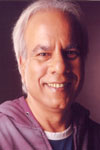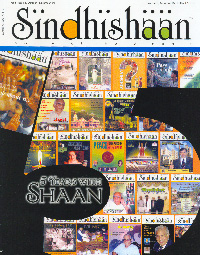Reflections on Being a Sindhi
By Arun Babani

WHAT MAKES ME A SINDHI?
I am a Sindhi in so far as I belong to a Sindhi family, having been born to a Sindhi set of parents. That’s it. Beyond that I hardly connect to ‘being a Sindhi.’ Let me explain.
A Sindhi is one who was born in Sindh. Just like a Gujarati is one who was born in Gujarat or a Bengali is one who is born in Bengal. The Sindh which gives me my communal identity is a politico-geographical space which is now situated in another, almost hostile nation.
I, who was NOT born in that space called Sindh, who has never set foot on it, much less have any contact with it, have no right to call myself a Sindhi. I was born in Bandra, Mumbai, and have lived here all my fifty-two years, in which case it is only correct to call myself a Bandriate or a Mumbaikar, a space I know like the back of my hand.
It is even politically correct to call myself so because Sindh as a Sindh-born Sindhi knows it, loves it, cannot be rightly claimed by me as my home town or birthplace. My generation of 'Sindhis' born in India, or elsewhere and still being known as Sindhis, resemble a signboard without a shop behind it, a name plate without a house behind it, a brand name without an actual product! That's the reason, frequently I am 'mistaken' for somebody else, misunderstood by the society surrounding me; “You don't look a Sindhi!” Perhaps the older Sindhis from Sindh have created a definition or a sign language and the present society is often confused at finding a 'different' product under the old labels! So, I, a Sindhi in my birth certificate don't fit the picture of a Sindhi in real life, rather I end up making people wonder, as if I am playing a double role, or as if I am impersonating a Sindhi, or enacting the role of a Sindhi.
On the other end of the spectrum is the question of the Sindhi culture and tradition. Even here I don't fit the bill of a 'true Sindhi'. Having been born in Bombay, and through western education I have a deeper connection to human beings everywhere. For example, I have a connection to Sufi traditions, be it Kabir or Meera or Bhuleshah or our Shah, Sachal and Sami. I am moved by Ghansham Vaswani singing Sant Kanwar as much as I am moved by Jagjit Singh singing Ghalib. This trait can be identified as Sufianiyat, Ruhaniyat, which is present universally in the deepest layers of Insaaniyat - a religion of brotherhood. In fact, I feel the Sindhis of my generation are blessed by their birth, having not being born in any one tradition or roots. Wherever Sindhis have been born and are being born, they, by their very political – disadvantage – of –being – rootless are in a very special and fortunate condition. Unlike the South Indian Brahmin in Chennai or a Maharastrian Dalit in Pune, who has always been, and will always be clutched by their birth tradition, a Sindhi need not be hooked onto such artificial and mundane labels which only cripple the soul, the Insaaniyat of man.
Religions, communities and castes are slowly dying. They should. These artificial labels have only led to wars and conflicts. Hence, Sindhis can be the harbingers of this new and universal Ruhaniyat by being the examples of a free and detached humanity by throwing away these old divisions that have entangled mankind since the past 5000 years.
In fact, I feel, in the future, all the communities, castes and religions will have to learn to be born thus, without the chains and crutches; they'll have to learn from us Sindhis to live an unfettered, light hearted and free life. I believe the post –partition Sindhis enjoy this natural privilege of being born without a nation and it is this unique quality that has the potential to make them the founder members of an age without boundaries, a truly global brotherhood of man, based on Sufianiyat.
Let Sindhis lay the foundation stone of a new, fresh and real vision for humanity
Arun Babani has presented a contrarian perspective when asked to pen an article on “Reflections on being a Sindhi”.
Sindhishaan invites comments from the readers on his views.


